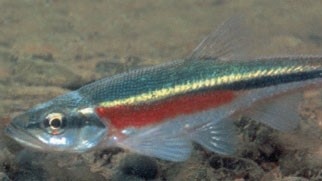Endangered Species Act changes will harm species at risk, say researchers
Changes to Ontario’s Endangered Species Act are being panned by fish researchers and nature lovers alike.
“The government is proposing to amend regulations under the Endangered Species Act and across the board these changes will weaken protection for species at risk,” said Anne Bell, director of Conservation and Education at Ontario Nature.
One of the amendments proposed last December affects a little fish called the Redside Dace that finds its home across southern Ontario, but primarily along the corridor of the proposed Highway 413 near Toronto.
Currently, the endangered fish would have to be vacant from an area for 20 years before habitat protections could be lifted. Amendments could lower that to 10 years, opening up more land for development, said Bell.
“The fact that it’s declining in 13 of the 17 watersheds in southern Ontario where it persists, and they want to weaken protections, not strengthen them for this animal, is very concerning,” said Bell.
The government says the proposed changes, which would also allow development “exemptions” in areas where newly listed species at risk in Ontario are found may speed up development, but will still protect the province’s most endangered animals.
 Redside Dace. (Source: Government of Ontario)
Redside Dace. (Source: Government of Ontario)
“The concern is they set the precedent to make changes to other species in the future, when their presence is an inconvenience to development,” said Nick Mandrak, a biological sciences professor at the University of Toronto, whose been studying fish biodiversity for more than 40 years.
While the government says these are reasonable changes to make, the goal is not to directly cut red tape or speed up development, it’s about finding a balance, between protections and progress.
“It isn’t red tape, because we have a legal responsibility to protect endangered species with the Endangered Species Act. Why would we want to change legislation that gives less protection to endangered species?” said Mandrak.
“It’s not an act to enable development; it’s an act to ensure that we protect species at risk. And we’re currently in the throws of a mass extinction. They’re calling it the sixth mass extinction event. We’re seeing an unprecedented and accelerated decline of species around the world,” said Bell.
CTVNews.ca Top Stories

Trudeau's 2024: Did the PM become less popular this year?
Justin Trudeau’s numbers have been relatively steady this calendar year, but they've also been at their worst, according to tracking data from CTV News pollster Nik Nanos.
Manhunt underway after woman, 23, allegedly kidnapped, found alive in river
A woman in her 20s who was possibly abducted by her ex is in hospital after the car she was in plunged into the Richelieu River.
Death toll in attack on Christmas market in Germany rises to 5 and more than 200 injured
Germans on Saturday mourned both the victims and their shaken sense of security after a Saudi doctor intentionally drove into a Christmas market teeming with holiday shoppers, killing at least five people, including a small child, and wounding at least 200 others.
Overheated immigration system needed 'discipline' infusion: minister
An 'overheated' immigration system that admitted record numbers of newcomers to the country has harmed Canada's decades-old consensus on the benefits of immigration, Immigration Minister Marc Miller said, as he reflected on the changes in his department in a year-end interview.
Wild boar hybrid identified near Fort Macleod, Alta.
Acting on information, an investigation by the Municipal District of Willow Creek's Agricultural Services Board (ASB) found a small population of wild boar hybrids being farmed near Fort Macleod.
Summer McIntosh makes guest appearance in 'The Nutcracker'
Summer McIntosh made a splash during her guest appearance in The National Ballet of Canada’s production of 'The Nutcracker.'
The winter solstice is here, the Northern Hemisphere's darkest day
The winter solstice is Saturday, bringing the shortest day and longest night of the year to the Northern Hemisphere — ideal conditions for holiday lights and warm blankets.
Back on air: John Vennavally-Rao on reclaiming his career while living with cancer
'In February, there was a time when I thought my career as a TV reporter was over,' CTV News reporter and anchor John Vennavally-Rao writes.
It's eggnog season. The boozy beverage dates back to medieval England but remains a holiday hit
At Scoma's Restaurant in San Francisco, this holiday season 's batch of eggnog began 11 months ago.
































